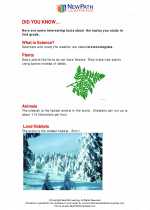Phenotype: Understanding the Expression of Traits
Phenotype refers to the observable physical and behavioral characteristics of an organism that are influenced by its genetic makeup and environmental factors. It is the result of the interaction between an organism's genotype (its genetic information) and the environment in which it develops.
Key Concepts:
- Genotype: The genetic makeup of an organism, including the specific alleles it possesses for a particular trait.
- Phenotype: The physical and behavioral traits that are expressed as a result of the genotype and environmental influences.
- Gene Expression: The process by which information from a gene is used to synthesize a functional gene product, such as a protein.
- Environmental Influences: External factors, such as nutrition, temperature, and exposure to toxins, that can impact the expression of an organism's traits.
Factors Affecting Phenotype:
Several factors contribute to the expression of an organism's phenotype:
- Genetic Variability: Differences in the alleles and gene combinations present in a population contribute to the diversity of phenotypes within that population.
- Environmental Conditions: The environment in which an organism develops can influence its phenotype, such as the availability of nutrients, exposure to sunlight, and temperature fluctuations.
- Gene Regulation: Mechanisms within the cell that control the expression of genes, including factors that can activate or repress gene expression.
Study Guide:
To better understand the concept of phenotype, consider the following study guide questions:
- What is the relationship between an organism's genotype and its phenotype?
- How do environmental factors contribute to the expression of an organism's phenotype?
- Provide examples of traits that are influenced by both genetic and environmental factors.
- Explain the concept of gene regulation and its impact on phenotype.
- Discuss the significance of genetic variability in contributing to the diversity of phenotypes within a population.
By exploring these questions and concepts, you can gain a deeper understanding of how genotype and environment interact to produce the observable traits of living organisms.
.◂Science Worksheets and Study Guides Second Grade. Did you know... 2nd Grade
Study Guide Did you know... 2nd Grade
Did you know... 2nd Grade  Worksheet/Answer key
Worksheet/Answer key Did you know... 2nd Grade
Did you know... 2nd Grade  Worksheet/Answer key
Worksheet/Answer key Did you know... 2nd Grade
Did you know... 2nd Grade  Worksheet/Answer key
Worksheet/Answer key Did you know... 2nd Grade
Did you know... 2nd Grade  Vocabulary/Answer key
Vocabulary/Answer key Did you know... 2nd Grade
Did you know... 2nd Grade 

 Worksheet/Answer key
Worksheet/Answer key
 Worksheet/Answer key
Worksheet/Answer key
 Worksheet/Answer key
Worksheet/Answer key
 Vocabulary/Answer key
Vocabulary/Answer key

The resources above cover the following skills:
Earth Systems Science
Weather and the changing seasons impact the environment and organisms such as humans, plants, and other animals. Students can:
Analyze ways in which severe weather contributes to catastrophic events such as floods and forest fires